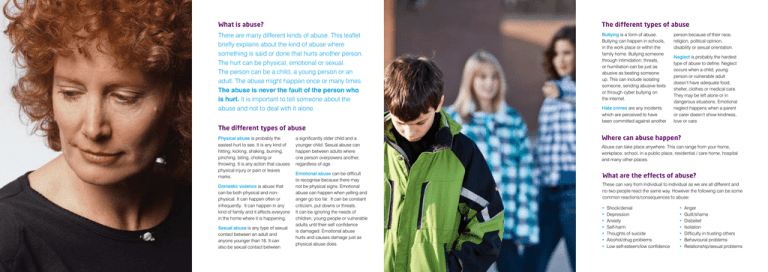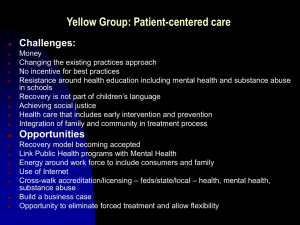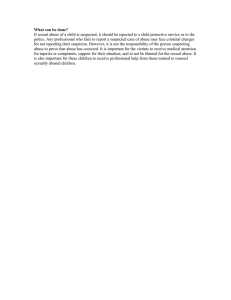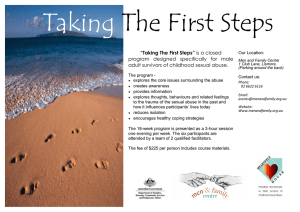
What is abuse?
The different types of abuse
There are many different kinds of abuse. This leaflet
briefly explains about the kind of abuse where
something is said or done that hurts another person.
The hurt can be physical, emotional or sexual.
The person can be a child, a young person or an
adult. The abuse might happen once or many times.
The abuse is never the fault of the person who
is hurt. It is important to tell someone about the
abuse and not to deal with it alone.
Bullying is a form of abuse.
Bullying can happen in schools,
in the work place or within the
family home. Bullying someone
through intimidation, threats,
or humiliation can be just as
abusive as beating someone
up. This can include isolating
someone, sending abusive texts
or through cyber bullying on
the internet.
Hate crimes are any incidents
which are perceived to have
been committed against another
person because of their race,
religion, political opinion,
disability or sexual orientation.
Neglect is probably the hardest
type of abuse to define. Neglect
occurs when a child, young
person or vulnerable adult
doesn’t have adequate food,
shelter, clothes or medical care.
They may be left alone or in
dangerous situations. Emotional
neglect happens when a parent
or carer doesn’t show kindness,
love or care.
The different types of abuse
Physical abuse is probably the
easiest hurt to see. It is any kind of
hitting, kicking, shaking, burning,
pinching, biting, choking or
throwing. It is any action that causes
physical injury or pain or leaves
marks.
Domestic violence is abuse that
can be both physical and nonphysical. It can happen often or
infrequently. It can happen in any
kind of family and it affects everyone
in the home where it is happening.
Sexual abuse is any type of sexual
contact between an adult and
anyone younger than 18. It can
also be sexual contact between
a significantly older child and a
younger child. Sexual abuse can
happen between adults where
one person overpowers another,
regardless of age.
Where can abuse happen?
Emotional abuse can be difficult
to recognise because there may
not be physical signs. Emotional
abuse can happen when yelling and
anger go too far. It can be constant
criticism, put downs or threats.
It can be ignoring the needs of
children, young people or vulnerable
adults until their self confidence
is damaged. Emotional abuse
hurts and causes damage just as
physical abuse does.
What are the effects of abuse?
Abuse can take place anywhere. This can range from your home,
workplace, school, in a public place, residential / care home, hospital
and many other places.
These can vary from individual to individual as we are all different and
no two people react the same way. However the following can be some
common reactions/consequences to abuse:
• Shock/denial
• Depression
• Anxiety
• Self-harm
• Thoughts of suicide
• Alcohol/drug problems
• Low self-esteem/low confidence
• Anger
• Guilt/shame
• Disbelief
• Isolation
• Difficulty in trusting others
• Behavioural problems
• Relationship/sexual problems
Where can I get help?
How do I get Counselling?
If you feel that you or someone else is not being treated in the way
they should be – tell someone about it. That might be:
You can either contact us yourself and we will arrange to meet with
you or someone else can contact us on your behalf. This may be your
GP, social worker or another person who is concerned about you.
• A parent
• A nurse
• A social worker
• A school counsellor
• A youth worker
If you are interested in finding out about us you can contact us at
the office or visit www.newlifecounselling.net for more information
and where you can fill in our online form. We will then be in touch to
set up an initial appointment.
• A health visitor
• A teacher
• A GP
If you are in immediate danger or want urgent help call 999 and ask
for the police
How could counselling help me?
“we’re listening”
If you are affected by abuse counselling can provide you with the
opportunity to talk on a one to one basis with a professionally trained
counsellor about this and give you some support.
Contact Details
What can I expect?
For further information or to
make a referral, please contact:
• What I talk about will be respected and treated in confidence.
• I won’t be judged
• I can be myself
• I will be listened to
• My side of the story will be heard
• To learn new ways of dealing with difficult thoughts or feelings
25 Ardoyne Road Belfast BT14 7HX
Tel: 028 9039 1630
Unit 20 North City Business Centre
2 Duncairn Gardens Belfast BT15 2GG
Tel: 028 9074 6184
www.newlifecounselling.net
Please Note
The advice given in this leaflet is intended to be helpful to most
people. It does not replace the direct advice of a healthcare
professional or counsellor. It is only a general guide and cannot
deal with all possible situations nor can it be specific to any one
individual. If you or someone you know needs help please contact
your GP as soon as possible to obtain further help.
“we’re listening”
Contact Details
For further information or to
make a referral, please contact:
25 Ardoyne Road Belfast BT14 7HX
Tel: 028 9039 1630
Unit 20 North City Business Centre
2 Duncairn Gardens Belfast BT15 2GG
Tel: 028 9074 6184
Hello.
We’re New Life Counselling,
we’re here to help you.
Are you suffering abuse?




